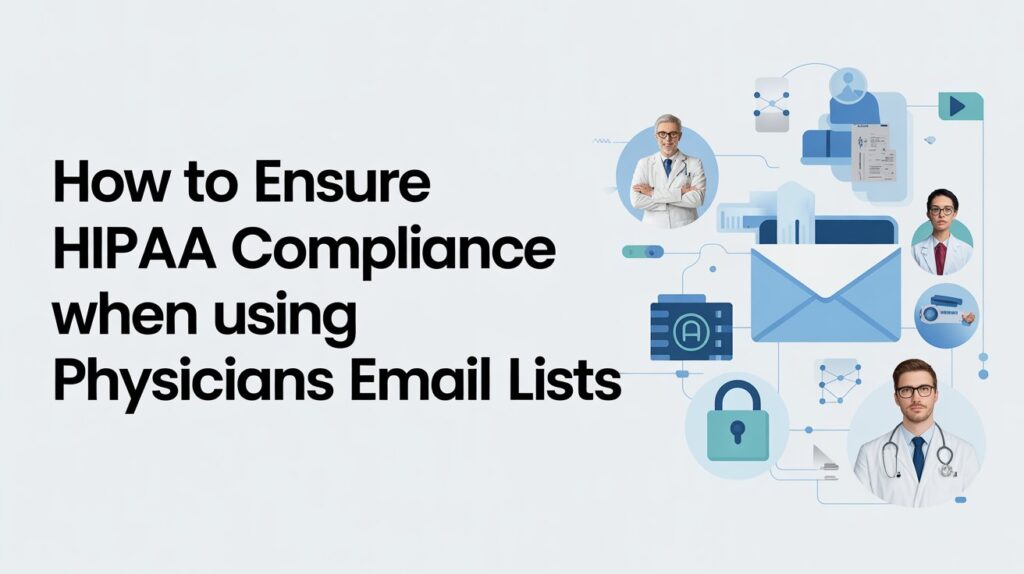
In the modern era of data-driven healthcare marketing, email remains a powerful tool for B2B outreach, brand awareness, and professional networking. Medical marketers, pharmaceutical brands, and healthcare technology firms often rely on a Physicians Email List to connect with verified doctors, specialists, and medical decision-makers.
However, in an industry governed by strict data privacy regulations, every email sent must comply with the Health Insurance Portability and Accountability Act (HIPAA). Failing to follow HIPAA standards can lead to legal penalties, data breaches, and loss of professional trust.
This comprehensive guide explains how to use a physicians contact database ethically and ensure complete HIPAA compliance — from data acquisition to campaign execution.
Understanding HIPAA: The Foundation of Data Privacy in Healthcare
HIPAA, enacted in 1996, was designed to protect individuals’ medical records and other personal health information. While it primarily safeguards Protected Health Information (PHI), the rules also apply to how businesses store, transmit, and share healthcare-related data.
In the context of a Physicians Email List, HIPAA governs:
- How the data was collected
- Who can access it
- How it’s stored and used in outreach
- What safeguards are in place to prevent misuse
Even though physicians are professionals, the database used to reach them must be ethically sourced and securely maintained to remain compliant.
Key HIPAA Rules Affecting Physicians Email Lists
| HIPAA Rule | Purpose | Relevance to Email Marketing |
| Privacy Rule | Protects all forms of PHI from unauthorized use | Prevents marketers from collecting or sharing identifiable patient or physician data without consent |
| Security Rule | Establishes safeguards for digital data | Requires encrypted emails, secure storage, and restricted access |
| Breach Notification Rule | Mandates disclosure of any data breach | Marketers must promptly notify authorities and affected individuals |
| Enforcement Rule | Details penalties for non-compliance | Non-compliant organizations can face penalties from $100 to $50,000 per violation, up to $1.5 million annually |
These rules underscore that even indirect handling of healthcare-related data — such as physician contact lists — demands responsible and transparent management.
Step-by-Step Guide to Ensuring HIPAA Compliance
1. Work Only with Verified, Reputable Data Providers
Your first step is to ensure your Physicians Email List comes from an ethical, compliant source. Reputable list providers:
- Collect contact details through verified public channels or opt-in methods
- Maintain regular data cleansing cycles (monthly or quarterly)
- Avoid including any PHI or patient information
- Provide documentation on compliance measures
Before purchasing or renting a database, request a data sourcing certificate or compliance declaration to validate its authenticity.
2. Implement Strong Encryption and Secure Storage
Email messages and databases containing physician contact details must be stored and transmitted securely.
Follow these key steps:
- Use SSL/TLS encryption for all email communications
- Host your database on secure, HIPAA-compliant servers
- Implement two-factor authentication (2FA) for account access
- Regularly back up data on encrypted systems
Even if your emails don’t contain PHI, encryption ensures that no unauthorized user can intercept or exploit your campaign data.
3. Never Include PHI in Marketing Emails
PHI includes any information that can identify an individual — such as name, date of birth, diagnosis, or treatment.
In physician-focused marketing, this might seem irrelevant, but careless inclusion of patient-related examples, screenshots, or case studies can violate HIPAA.
Your outreach should focus solely on:
- Professional development opportunities
- Product information
- Clinical trial participation
- Continuing medical education (CME) events
- Research collaboration invites
Avoid any content that references patients or specific medical cases unless you have explicit, documented consent.
4. Maintain Limited, Role-Based Access Controls
Access to your physicians database should be strictly limited.
Implement role-based access control (RBAC) to ensure only authorized employees (such as marketing managers or compliance officers) can view, download, or edit the data.
Keep a digital audit trail that records:
- Who accessed the data
- When the data was accessed
- What actions were performed
This record not only enhances transparency but also protects you during compliance audits.
5. Sign Business Associate Agreements (BAAs)
When outsourcing marketing, hosting, or email automation to a third-party vendor (e.g., Mailchimp, HubSpot, Salesforce Marketing Cloud), ensure that they sign a Business Associate Agreement (BAA).
A BAA legally binds vendors to follow HIPAA standards when processing or storing your data. Without it, you could be held liable for breaches that occur on their systems.
6. Obtain Consent and Include Opt-Out Mechanisms
HIPAA intersects with CAN-SPAM and GDPR, which both emphasize consent and transparency in communication.
To remain compliant:
- Collect clear, documented consent before adding physicians to mailing lists
- Always include an unsubscribe or opt-out link in every email
- Honor opt-out requests immediately (within 10 business days or less)
- Keep consent logs securely stored as proof of compliance
Transparent practices not only ensure legal protection but also build long-term trust among healthcare professionals.
7. Regularly Audit and Update Your Data
Data accuracy is a vital component of compliance. Outdated or incorrect information increases the risk of unsolicited or misdirected communication.
Establish an ongoing data hygiene routine that includes:
- Quarterly verification of email addresses and credentials
- Bounce rate monitoring to remove inactive contacts
- Cross-referencing with updated medical directories and licensing databases
Regular audits maintain both the reliability of your campaigns and the integrity of your compliance framework.
8. Conduct Employee Training and Compliance Audits
HIPAA compliance is not just a technical checklist — it’s an organizational culture.
Train your team regularly on:
- Recognizing PHI and sensitive data
- Safe email handling and phishing awareness
- Procedures for reporting data breaches
Conduct annual HIPAA audits to identify gaps in data protection and document all corrective actions taken.
Common HIPAA Violations in Email Marketing
- Using unencrypted email platforms for outreach
- Sharing data with unverified third-party vendors
- Ignoring unsubscribe requests or opt-out preferences
- Retaining old, inaccurate contact data
- Sending bulk messages without BCC or segmentation
Even small oversights can lead to compliance failures, which is why proactive monitoring is essential.
Why HIPAA Compliance Enhances Brand Credibility
Beyond avoiding legal trouble, HIPAA compliance demonstrates professionalism and reliability.
When healthcare providers receive compliant, respectful, and data-secure communication, they are far more likely to:
- Engage with your brand
- Participate in your programs
- Trust your long-term partnership
Compliance fosters credibility, transparency, and ethical leadership — three pillars essential for success in healthcare marketing.
Conclusion
In healthcare marketing, ensuring HIPAA compliance when using a Physicians Mailing List is essential, not optional. Every step—from sourcing verified data, implementing strong encryption, and managing secure access controls, to obtaining proper consent and providing ongoing staff training—plays a critical role in maintaining legal and ethical standards.
Organizations that prioritize compliance not only avoid costly penalties but also cultivate trust and credibility within the medical community. A robust privacy framework enables marketers to execute high-performing, secure campaigns that protect sensitive information, strengthen brand reputation, and expand professional engagement through a trusted Physician Email List.
